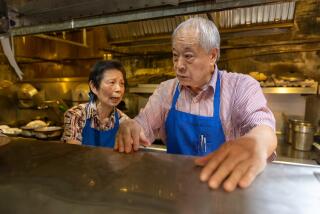An American success story
- Share via
FROM SACRAMENTO — Seventy years ago today, a Chinese immigrant -- an “illegal alien” -- opened a restaurant in a rundown former speakeasy two blocks from the state Capitol.
Frank Fat named the eatery after himself, advertising “something different . . . “
“Chinese and American dinners served in lovely, peaceful Oriental atmosphere by charming, beautiful and courteous Chinese waitresses. . . . Dinners, full course with a large choice of entrees, 50 cents up. Lunches 25 cents. Try Frank’s special steak . . . they’re delicious.”
Yes, they were and still are -- sliced and smothered in sauteed onions and oyster sauce. Today’s price: $25.95 a la carte.
In 1939, the Depression still lingered and a half-buck wasn’t spent lightly, even by lobbyists on politicians’ dinners.
But Fat’s quickly became a hit with the political crowd, especially the state attorney general and future governor, Earl Warren, who regularly lunched there until he was appointed Supreme Court chief justice in 1953.
Seventy years is a long time for any small business to survive in one location, especially a restaurant. But Fat’s -- family owned and operated -- has prospered while other once-venerable capital fueling stations have gone belly-up.
The principal reason is that, like any good politician, Fat’s always has been liked and trusted by its constituents.
“You give people good food, a nice place to eat it in and make them happy. Pretty simple, really,” Frank Fat once explained.
And political secrets are safe. “I try not to listen,” says Frank’s grandson, Weyland Fat, who shares host duties with his cousin, Kevin Fat.
There are at least two reasons why this restaurant’s birthday should be observed.
One, of course, is that the Fat family is the epitome of the American Dream.
Frank Fat sailed to San Francisco in 1919 at age 16, speaking no English and using a false ID. He picked fruit, washed dishes, swept up, waited tables -- in Sacramento, Detroit, Chicago -- endured discrimination and even slept nights on the stone steps of a restaurant basement. “It was good enough for me,” he said years later.
He and his wife, Mary, had six children, all college educated. The family now owns five restaurants and a catering service.
Fat opened his original restaurant with $2,000 borrowed from a man whom he had impressed. He was waiting tables at a Sacramento restaurant with a basement gambling hall. A state official came in and asked him to go downstairs and place a keno bet. The guy won $2,000 but, not realizing it, left before Frank could return with the money. The immigrant waiter held on to the winnings until he saw the amazed, thankful man several weeks later -- and won himself a lender to launch his restaurant business.
Frank Fat died in 1997 at 93. His son, Wing Fat, who had succeeded Frank as manager and smiling host in 1971, died in 2005 at 79. Kevin Fat, 42, Wing’s nephew, is now the manager.
The heyday for Frank Fat’s restaurant, Kevin says, was when “people made relationships by talking face to face, not by e-mail, not by texting.”
And that’s the second reason for observing this birthday: It’s a chance to reflect back on an era when legislators tended to become bipartisan pals and pragmatic producers of good public policy.
Fat’s -- and other Capitol watering holes -- provided the political equivalent of campfire camaraderie.
It wasn’t always pretty from a reformer’s perspective. Lobbyists usually sprang for drinks and dinner.
“Pigeons -- that’s what we called lobbyists in those days,” recalls former Assembly Speaker Willie Brown (D-San Francisco). “You’d go to Fats looking for a pigeon. My guess is Fat’s is still sending some lobby firms bills from those years.”
That ended in 1974 when a Jerry Brown ballot initiative limited the pigeons’ tabs to $10 per month -- “enough for two hamburgers and a Coke,” Brown said.
But these days, rather than popping for $25 meals, lobbyists routinely kick in $2,500 at legislators’ fundraisers. And nobody has much fun.
Political “reform” didn’t stop people from going to Fat’s. Many went: Gov. Jerry Brown, Speaker Willie Brown, most legislative leaders and wannabes -- and the next two governors occasionally, George Deukmejian and Pete Wilson.
“I’d go often,” Jerry Brown says. “I’d go late. I was a single guy and didn’t cook in my apartment. I probably ate at Frank Fat’s more than anywhere else.” Brown says he’d order Yu Kwok fried dumplings and Sang Gai Shee chow mein.
“Legislators were there. My staff would be there.”
Many political deals were struck at Fat’s -- the most famous being the 1987 “Napkin deal.”
Lobbyists for trial lawyers, insurers, business, doctors and tobacco convened at Fat’s one summer evening to negotiate the final piece of a product-liability bill that had been fought over for months. Speaker Brown came in late and forced a settlement. Then they adjourned to an upstairs private room to celebrate.
Senate Judiciary Committee Chairman Bill Lockyer, now the state treasurer, joined the group and suggested that the warring interests agree to a five-year peace pact. Great idea, they said. Lockyer scribbled the pact on a linen napkin and the lobbyists signed it.
“Everybody was handing me yellow pads,” Lockyer later told me. “I thought it would be more theatrical to write on a napkin. I wanted to create more Capitol lore.”
Lockyer still has the napkin. A copy of it is framed at Fat’s.
“Fat’s was the place where everything happened,” recalls former Senate Republican Leader Bill Campbell. “We really solved all the world’s problems. It was a much more pleasant Legislature back then. People got to know each other. We could sit down and disagree and have a friendly argument.”
Things have changed -- not just because of political reform, but because term limits have made legislators more competitive and left them without enough time to develop solid relationships. Plus, drunk-driving laws discourage bar-hopping.
Lobbyists still lunch at Fat’s, but legislators tend to eat at their desks or raise campaign funds. Fat’s has more of a civil service crowd these days. Also, there are new restaurants nearer the Capitol.
But Frank Fat’s survives, even if the pragmatic politics it nourished for decades has regretfully perished.
--
More to Read
Eat your way across L.A.
Get our weekly Tasting Notes newsletter for reviews, news and more.
You may occasionally receive promotional content from the Los Angeles Times.








